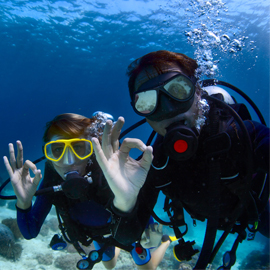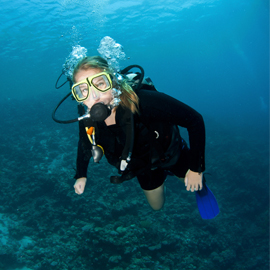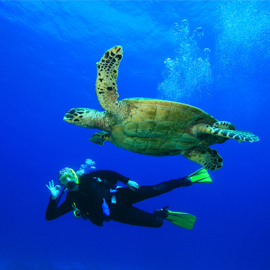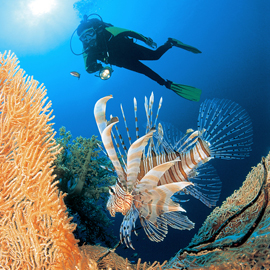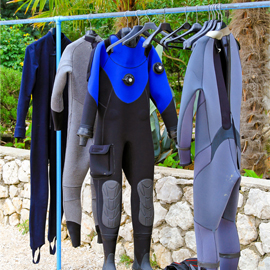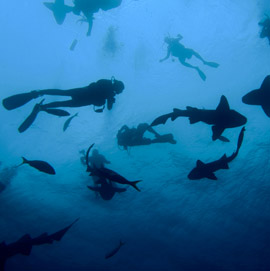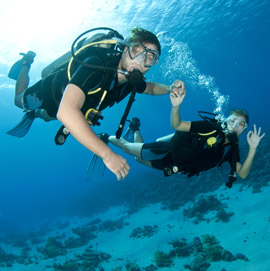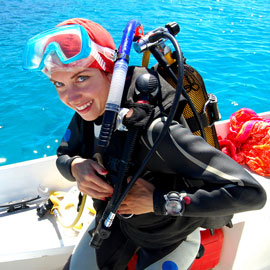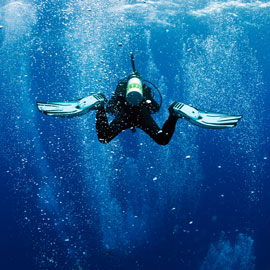Dive Blog | Do Dive In
Have You “Liked” Us On Facebook?
Be Among the First to Know: Want to be among the first to learn about the latest in local diving and activities? How about being the first to find out about new gear or travel opportunities? The best way is to visit our Facebook page and “Like” us. We always post new information there first. […]
Preventing Problems on Your Dives
Though we sincerely hope that you have nothing but smooth experiences after getting your scuba certification in Illinois, the unfortunate fact remains: things can go wrong underwater. Before you take the plunge, it helps to become aware of potential problems and the best ways to circumvent them. [Read more]
Healthy Diver – Happy Diver
Scuba diving can be relaxing, but it can also be physically demanding. Sometimes when we’re underwater, we need to quickly perform strenuous tasks, especially in emergency situations. Though you by no means have to be an Olympic athlete to stay safe on your dives, good health and conditioning will help you improve both your safety and efficiency. [Read more]
Dive Responsibly
Because preserving aquatic environments should be a goal for every diver, it’s important to always keep your contact with underwater life responsible. Sometimes our actions can terrorize, injure or even kill aquatic life, regardless of whether this outcome is intentional. No matter where you’re diving or why, you should always be aware of how your activities affect the organisms and ecosystem around you. [Read more]
What the Fish?
There are an estimated 21,000 species of fish in the world and getting a closer look at them is one of the major attractions of scuba diving certification. From Illinois reservoirs to Caribbean coral reefs, there are fish of countless colors, shapes and sizes awaiting you underwater. [Read more]
Scuba Equipment Care and Storage
Because we each rely on our scuba equipment to keep us safe and comfortable underwater, taking good care of it should be a priority. Whether you’re investing in gear for the first time after scuba diving certification or hope to boost the longevity of well-used equipment, caring for your equipment is essential in keeping it reliable and ready for the next dive. [Read more]
Swimming with the Sharks
Many divers seem to be just as attracted to shark encounters as they are apprehensive of them. Despite their dangerous reputation, sharks pose little risk to scuba divers—it’s often said that you’re more likely to be struck by lightning than attacked by a shark, and there are countless places worldwide to experience a safe and well-managed shark encounter. [Read more]
Scuba Support: Mastering the Buddy System
From divers plumbing the ocean’s depths to preschoolers on a field trip, there’s a reason the buddy system is so widely used: it works. Though it is possible to dive on your own, diving with a buddy is both safer and more practical. Your buddy is there to help you put on and check your dive equipment before you go underwater, your buddy is there to help you out of a bind if you need assistance and your buddy is there to share the fun of the diving experience with you. [Read more]
Get Ready for Boat Diving
Whether the dive boat you’re embarking on is a tiny dinghy, a 6 pack or a multi-diver behemoth, following a few simple rules will make things easier for you and the crew. While you can take advantage of our boat diver specialty class to learn all there is to know about diving from different kinds of boats, the tips below can help you be a perfectly polite and well-prepared boat diver on any excursion. [Read more]
Nitrox Diving: The Benefits and Precautions
After receiving your scuba certification in Illinois, you’ll have the opportunity to start expanding on your skills by learning more advanced scuba techniques. For many, this means taking specialty diver classes that help you master new skills, and no skill can help you get more out of every scuba experience than nitrox diving. [Read more]

